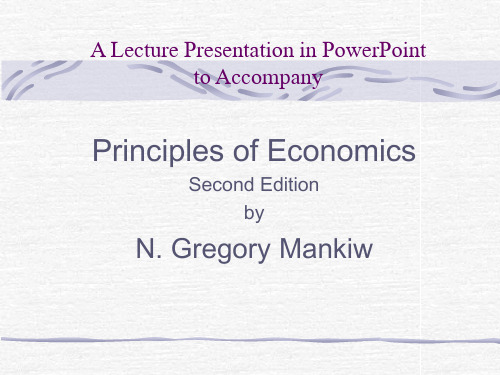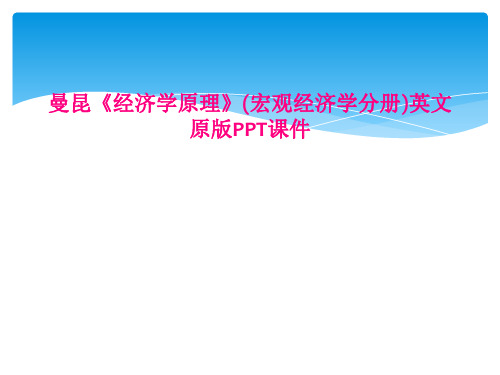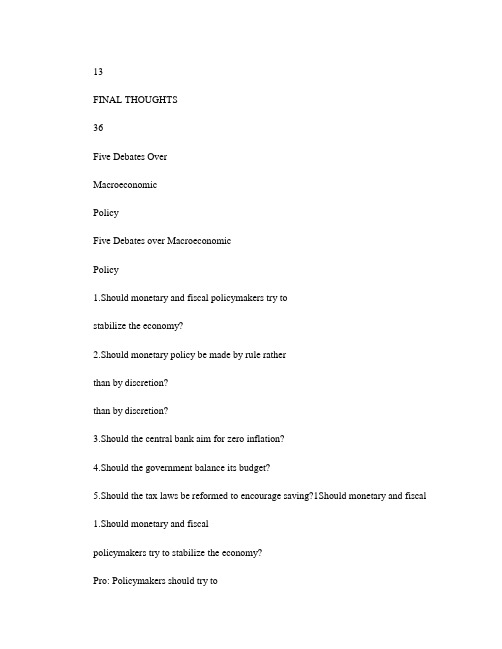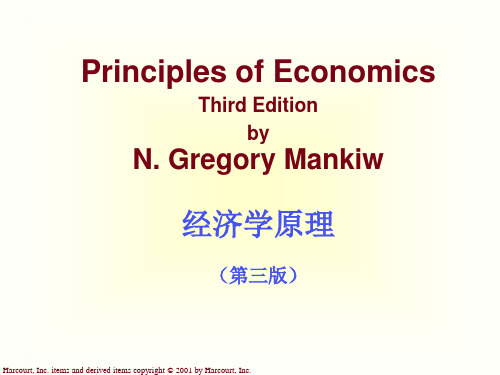曼昆经济学原理第一章(英文)PPT课件
经济学原理曼昆版(第五版)课件第一章

消费多少
▪ 企业决定生产多少,雇佣多少工人 ▪ 社会决定如何在国防,消费物品,环境保护和其
他需求之间分配资源
经济学十大原理
3
人们如何做出决策
经济学十大原理
4
人们如何做出决策
原理一: 人们面临权衡取舍
所有决策都面临着权衡取舍。比如:
▪ 参加期中考试前一天晚上的聚会意味着更少的时
原理 8 :一国的生活水平取决于它生产物品与 劳务的能力
▪ 决定生活水平的最重要因素:生产率,即每一单位劳
动投入所生产的物品与劳务数量
▪ 生产率取决于设备,劳动者的技能以及可用的技术 ▪ 其它因素(比如,工会组织,国外的竞争)对于生活
水平的影响远远小于生产率
经济学十大原理
26
整体经济如何运行
原理 9 :当政府发行了过多货币时,物价上升
▪
每天都是美好的一天,新的一天开启 。20.12.2520.12.2506:4506:45:1406:45:14Dec-20
▪
相信命运,让自己成长,慢慢的长大 。2020年12月25日星 期五6时 45分14秒Friday, December 25, 2020
▪
爱情,亲情,友情,让人无法割舍。20.12.252020年 12月25日星期 五6时45分14秒20.12.25
B. 如果变速器正常,汽车价值是$6000 。如果不 正常,则是$5500
经济学十大原理
12
主动学习 1
参考答案
修理变速器的成本= $600
A. 如果变速器正常,汽车价值是$6500 。如果不正 常,则是$5700
修理变速器的收益= $800 ($6500 – 5700) 因此,修理变速器是值得的
西方经济学曼昆 PPt 经济学十大原理

二、经济学的研究内容 1.人们如何做出决策? 2.个人决策如何影响他人?人们 怎样交易? 3.所有决策和相互交易共同组成 “经济”,影响整个经济的力量 和趋势如何。
三、经济学十大原理 1、人们面临权衡取舍
资源稀缺性要求人们做出选择。“鱼和 熊掌不可兼得”人们将在稀缺资源的多种用 途中进行权衡比较,根据自己的各种需要的 强弱缓急做出选择,找出对自己最有利的配 置方法。如个人的选择:安排时间、金钱 社会的选择:“大炮与黄油”、效率 (efficiency)与平等(equity)、保护环境与 增加收入
5、贸易能使每个人状况更好
竞争各方相互贸易,每个人、 竞争各方相互贸易,每个人、每个国家可 以专门从事自己最擅长的活动,通过交易,人 以专门从事自己最擅长的活动,通过交易, 们可以按较低的成本获得各种各样的物品和劳 务。
6、市场通常是组织经济活动的一种好方法
社会不同的选择和资源配置方式决定了不同的 经济制度。市场经济(market economy)和计划经 济差别: *决策机制不同:前者由市场参与者分散、自 主决策。后者由至高无上的中央计划机关决策 *协调机制不同:前者用价格协调千千万万的决 策,后者有金字塔形的等级体系,用自上而下的 命令方式贯彻决策,保证决策协调 *激励机制不同:前者以个人利益为中心,后者 以集体主义为中心
曼昆经济学原理 第一章ppt

2
The principles of HOW PEOPLE MAKE DECISIONS
HOW PEOPLE MAKE DECISIONS
Principle #1: People Face Tradeoffs
All decisions involve tradeoffs. Examples:
can to achieve their objectives.
make decisions by evaluating costs and benefits
of marginal changes – incremental adjustments to an existing plan.
TEN PRINCIPLES OF ECONOMICS
In this chapter, look for the answers to these questions:
What kinds of questions does economics address?
What are the principles of how people make
When a manager considers whether to increase
output, she compares the cost of the needed labor and materials to the extra revenue.
TEN PRINCIPLES OF ECONOMICS
Equality: when prosperity is distributed uniformly
among society’s members
曼昆经济学原理课件(PPT 36页)

2006 年 花费比
例
标准普尔500指数(指数基金) 大型管理基金 标准普尔中型股400指数(指数基
金)
中型管理基金 标准普尔小型股300指数(指数基
金)
小型管理基金
6.2% 5.9
10.9 8.1
12.5 10.3
0.351 1.020
0.535 1.458
0.550 1.272
基本金融工具
32
市场非理性
基本金融工具
7
例2: 投资决策
▪ 如果 r = 0.09.
通用汽车公司是否应该花1亿美元造一个在未来十 年内能产生两亿美元收入的工厂?
▪ 解决办法:找出未来十年两亿美元的现值
PV = ($200 百万)/(1.09)10 = $84 百万 因为 PV < 工厂成本,通用公司不应该造这个工 厂
现值帮助解释了为什么利率上升时投资会减少
A. Joe在买火险之后开始在床上吸烟
B. Susan的父母都因为牙龈疾病而失去了他们的牙 齿,因此Susan购买了牙科保险
C. 当Cindy停她的克尔维特敞篷车时,她懒得把车 顶关好,因为她购买的保险能够补偿车内的任 意失窃
18
主动学习 2
参考答案
指出下述情形属于逆向选择还是道德风险的例子 A. Joe在买火险之后开始在床上吸烟
基本金融工具
现期财 富
财富
14
效用函数与风险厌恶
效用
赢得1000美元获 得的效用
输掉1000美 元损失的效
用
由于边际效用递减, 损失1000美元减少的 效用大于得到1000美 元增加的效用
财富 –1000 +1000
基本金融工具
15
曼昆经济学原理第一章

Copyright © 2004 South-Western/Thomson Learning
TEN PRINCIPLES OF ECONOMICS
• How people interact with each other.
• Trade can make everyone better off. • Markets are usually a good way to organize economic activity. • Governments can sometimes improve economic outcomes.
Copyright © 2004 South-Western/Thomson Learning
Principle #3: Rational People Think at the Margin. • Marginal changes are small, incremental adjustments to an existing plan of action.
1
INTRODUCTION
Ten Principles of Economics
1
Copyright © 2004 South-Western/Thomson Learning
Economy. . .
. . . The word economy comes from a Greek word for “one who manages a household.”
• Households decide what to buy and who to work for. • Firms decide who to hire and what to produce.
曼昆英文版《经济学原理》01-经济学十大原理

Marginal changes are small, incremental adjustments to an existing plan of action.
People make decisions by comparing costs and benefits at the margin.
Guns v. butter Food v. clothing Leisure time v. work Efficiency v. equity Making decisions requires trading off one goal against another.
1. People face tradeoffs. Efficiency v. Equity
1. People face tradeoffs.
"There is no such thing as a free lunch! lunch!"
1. People face tradeoffs.
To get one thing, we usually have to give up another thing.
7. Governments can sometimes improve market outcomes.
Market failure may also be caused by market power, which is the ability of a single person or firm to unduly influence market prices.
曼昆《经济学原理》(宏观经济学分册)英文原版PPT课件

THE COMPONENTS OF GDP • GDP includes all items produced in the economy and sold legally n markets. • What Is Not Counted in GDP?
– Every transaction has a buyer and a seller. – Every dollar of spending by some buyer is a dollar of income for some seller.
© 2007 Thomson South-Western
Y = C + I + G + NX
© 2007 Thomson South-Western
THE COMPONENTS OF GDP • Consumption (C):
• The spending by households on goods and services, with the exception of purchases of new housing. • Investment (I):
© 2007 Thomson South-Western
Table 2 Real and Nominal GDP
© 2007 Thomson South-Western
Table 2 Real and Nominal GDP
© 2007 Thomson South-Western
Table 2 Real and Nominal GDP
• “. . . Final . . .” – It records only the value of final goods, not intermediate goods (the value is counted only once).
曼昆《经济学原理》(宏观经济学分册)英文原版PPT课件精编版

Factors of production
Wages, rent, and profit
MARKETS FOR
Labor, land, and capital
FACTORS OF PRODUCTION
•Households sell •Firms buy
Income
= Flow of inputs and outputs
= Flow of dollars
© 2007 Thomson South-Western
THE MEASUREMENT OF GROSS பைடு நூலகம்OMESTIC PRODUCT
• Gross domestic product (GDP) is a measure of the income and expenditures of an economy.
THE COMPONENTS OF GDP
• GDP includes all items produced in the economy and sold legally in markets.
• What Is Not Counted in GDP?
– GDP excludes most items that are produced and consumed at home and that never enter the marketplace.
• “ . . . Within a Country . . .”
– It measures the value of production within the geographic confines of a country.
• “. . . In a Given Period of Time.”
曼昆经济学原理优秀课件

THE DESIGN OF THE TAX SYSTEM
7
12.1管理负担
▪ 包括人们为遵照税法纳税时花费的时间与金钱
▪ 鼓励人们将资源用在合法避税上面
▪ 比如,雇佣会计师寻找税制的漏洞来减少税收负
担
▪ 是无谓损失的一种
▪ 通过简化税法可以减少税制的管理负担,但这种
消除漏洞的税法在政治上是困难的
THE DESIGN OF 等的牺牲”
▪ 注意一个人的牺牲量不仅取决于他支付了多少税
收,而且还取决于他的收入和其他环境
▪ 一个穷人缴纳$10,000的税比一个富人缴纳
$10,000 的税做出的牺牲还大
THE DESIGN OF THE TAX SYSTEM
14
12.2纵向平等
▪ 纵向平等: 主张支付能力更强的纳税人应该缴纳
25,000 25
200,000 40,000 20
50,000 25
60,000 30
THE DESIGN OF THE TAX SYSTEM
17
美国联邦政府所得税率: 2007
应纳税收入
税率
美国是一个实 行累进所得税 率的国家
0 – $7,825 7,825 – 31,850 31,850 – 77,100 77,100 – 160,850 160,850 – 349,700 超过 $349,700
到等量的收入,这种税制就比另一种更有效率
▪ 纳税人的成本包括:
▪ 税收支付本身 ▪ 无谓损失 ▪ 管理负担
THE DESIGN OF THE TAX SYSTEM
4
12.1无谓损失
▪ 经济学十大原理之一:
人们会对激励做出反应
▪ 回忆第八章的内容:
曼昆《经济学原理》(宏观经济学分册)英文原版课件

FYI: The Production Function• Y = A F(L, K, H, N)• Y = quantity of output• A = available production technology• L = quantity of labor• K = quantity of physical capital• H = quantity of human capital• N = quantity of natural resources• F( ) is a function that shows how the inputs are combined.
© 2007 Thomson South-Western
ECONOMIC GROWTH ANDPUBLIC POLICY• Government policies that raise productivity and living standards– Encourage saving and investment.– Encourage investment from abroad.– Encourage education and training.– Establish secure property rights and maintain political stability.– Promote free trade.– Promote research and development.
© 2007 Thomson South-Western
How Productivity Is Determined• Technological knowledge includes society’s understanding of the best ways to produce goods and services.• Human capital includes the resources expended transmitting this understanding to the labor force.
曼昆《经济学原理》英文原版重要知识点课件

13FINAL THOUGHTS36Five Debates OverMacroeconomicPolicyFive Debates over MacroeconomicPolicy1.Should monetary and fiscal policymakers try tostabilize the economy?2.Should monetary policy be made by rule ratherthan by discretion?than by discretion?3.Should the central bank aim for zero inflation?4.Should the government balance its budget?5.Should the tax laws be reformed to encourage saving?1Should monetary and fiscal 1.Should monetary and fiscalpolicymakers try to stabilize the economy?Pro: Policymakers should try tostabilize the economy•The economy is inherently unstable, and left on its own will fluctuate.•Policy can manage aggregate demand in order to offset this inherent instability and reduce the to offset this inherent instability and reduce the severity of economic fluctuations.Pro: Policymakers should try tostabilize the economy •There is no reason for society to suffer through the booms and busts of the business cycle.•Monetary and fiscal policy can stabilize aggregate demand and,thereby,production and aggregate demand and, thereby, production and employment.Con: Policymakers should not try to stabilize the economy •Monetary policy affects the economy with long and unpredictable lags between the need to act and the time that it takes for these policies to work.•Many studies indicate that changes in monetary policy have little effect on aggregate demand until about six months after the change is made.Con: Policymakers should not try to stabilize the economy •Fiscal policy works wi th a lag because of the long political process that governs changes in spending and taxes.•It can take years to propose,pass,andIt can take years to propose, pass, and implement a major change in fiscal policy.Con: Policymakers should not try to stabilize the economy•All too often policymakers can inadvertently exacerbate rather than mitigate the magnitude of economic fluctuations.•It might be desirable if policy makers couldPro: Monetary policy should bemade by rule •Discretionary monetary policy c an suffer fromincompetence and abuse of power.•To the extent that central bankers allythemselves with politicians,discretionary themselves with politicians, discretionarypolicy can lead to economic fluctuations thatreflect the electoral calendar—the politicalbusiness cycle.Pro: Monetary policy should bemade by rule•There may be a discrepancy between what policymakers say they will do and what they actually do—called time inconsistency of policy.p y•Because policymakers are so often time inconsist ent, people are skeptical when central bankers announce their intentions to reduce the rate of inflation.Pro: Monetary policy should bemade by rule •Committing the Fed to a moderate and steady growth of the money supply would limit incompetence, abuse of power, and time inconsistency.y Con: Monetary policy should not bemade by rule•An important advantage of discretionary monetary policy is its flexibility.•Inflexible policies will limit the ability of policymakers to respond to changing economic policymakers to respond to changing economic circumstances.Con: Monetary policy should not bemade by rule•The alleged problems with discretion and abuseof power are largely hypothetical.•Also, the importance of the political businesscycle is far from clear.cycle is far from clear.3.Should the central bank aim for zeroinflation?Pro: The central bank should aim forzero inflation•Inflation confers no benefit to society, but it imposes several real costs.•Shoeleather costs•Menu costs•Increased variabil ity of relative prices•Unintended changes in tax liabilities•Confusion and inconvenience•Arbitrary redistribution of wealth Pro: The central bank should aim forzero inflation•Reducing inflation is a policy with temporary costs and permanent benefits.•Once the disinflationary recession is over, the benefits of zero inflation would persist. benefits of zero inflation would persist.Con: The central bank should notaim for zero inflation•Zero inflation is probably unattainable, and toget there involves output, unemployment, andsocial costs that are too high.•Policymakers can reduce many of the costs ofPolicymakers can reduce many of the costs ofinflation without actually reducing inflation. 4.Should fiscal policymakers reducethe government debt?Pro: The government shouldbalance its budget •Budget deficits impose an unjustifiable burden on future generations by raising their taxes and lowering their incomes.•When the debts and accumulated interest come When the debts and accumulated interest come due, future taxpayers will face a difficult choice:•They can pay higher taxes, enjoy less governmentspending, or both.Pro: The government shouldbalance its budget•By shifting the cost of current government benefits to future generations, there is a bias against future taxpayers.•Deficits reduce national saving,leading to a Deficits reduce national saving, leading to a smaller stock of capital, which reduces productivity and growth.Con: The government should notbalance its budget•The problem with th e deficit is often exaggerated.•The transfer of debt to the future may be justified because some government purchases justified because some government purchases produce benefits well into the future.Con: The government should notbalance its budget•The government debt can continue to rise because population growth and technological progress increase the nation’s ability to pay the interest on the debt.5.Should the tax laws be reformed to encourage saving?Pro: Tax laws should be reformed toencourage saving•A nation’s saving rate is a key determinant of its long-run economic prosperity.•A nation’s productive capability is determined largely by how much it saves and invests for the largely by how much it saves and invests for the future.•When the savin g rate is higher, more resources are available for investment in new plant and equipment.Pro: Tax laws should be reformed toencourage saving•The U.S. tax system discourages saving in many ways, such as by heavily taxing the income from capital and by reducing benefits for those who have accumulated wealth.Pro: Tax laws should be reformed toencourage saving•The consequences of high capital income tax policies are reduced saving, reduced capital accumulation, lower labor productivity, and reduced economic growth.gPro: Tax laws should be reformed toencourage saving•An alternative to current tax policies advocated by many economists is a consumption taxconsumption tax.•With a consumption tax, a household pays taxes based on what it spends not on what it earns. based on what it spends not on what it earns.•Income that is saved is exempt from taxation untilthe saving is later withdrawn and spent onconsumption goods.Con: Tax laws should not bereformed to encourage saving •Many of the changes in tax la ws to stimulate saving would primarily benefit the wealthy.•High-income households save a higher fraction of their income than low-income households.•Any tax change that favors people who save willalso tend to favor people with high incomes.2009-11-1 C on: Tax laws should not be reformed to encourage saving • Reducing the tax burden on the wealthy would lead to a less egalitarian society. • This would also force the government to raise the tax burden on the poor. Con: Tax laws should not be reformed to e ncourage saving • Raising public saving by eliminating the government’s budget deficit would provide a more direct and equitable way to increase national saving.g Summary • Advocates of active monetary and fiscal policy view the economy as inherently unst able and believe policy can be used to offset this inherent instability. y • Critics of active policy emphasize that policy affects the economy with a lag and our ability to forecast future economic conditions is poor, both of which can lead to policybein g destabilizing. Summary • Advocates of rules for monetary policy argue that discretionary policy can suffer from incompetence, abuse of power, and time inconsistency. y • Critics of rules for monetary policy argue that discretionary policy is more flexibl e in responding to economic circumstances. Summary • Advocates of a zero-inflation target emphasize that inflation has many costs and few if any benefits. zero-inflation • Critics of a zero inflation target claim that moderate inflation imposes only small costs on society, whereas the recession necessary to reduce inflation is quite costly. Summary • Advocates of reducing the government debt argue that the debt imposes a burden on future generations by raising their taxes and lowering their incomes. • Criti cs of reducing the government debt argue that the debt is only one small piece of fiscal policy. 62009-11-1 Summary • Advocates of tax incentives for saving point out that our society discourages saving in many ways such as taxing income from capital and reducing benefits for those who have g accumulated wealth. • Critics of tax incentives argue that many proposed changes to stimulate saving would primarily benefit the wealthy and also might have only a small effect on private saving. 7。
《曼昆经济学原理》课件

比较优势
各国根据自身的资源、技术和 成本优势进行专业化生产,实
现全球资源的最优配置。
贸易条件
贸易条件的变化对出口国和进 口国的影响,以及贸易条件与
经济增长的关系。
贸易政策
自由贸易政策和保护贸易政策 的优缺点,以及政策制定时应
考虑的因素。
国际金融
国际收支
国际收支平衡表的构成,以及影响国际收支 的因素。
国际货币体系
国际金本位制、布雷顿森林体系和牙买加体 系的比较和演变。
外汇市场
外汇市场的参与者、交易方式和汇率决定机 制。
资本流动
资本流动的原因、影响和风险。
汇率制度
固定汇率制度
固定汇率制度的优点和缺点,以及应 对货币投机的策略。
浮动汇率制度
浮动汇率制度的优点和缺点,以及汇 率浮动对经济的影响。
汇率目标区
国际合作在全球化进程中的作用和 必要性。
04
PART 05
经济学理论
REPORTING
古典经济学
01
总结词
古典经济学主张自由市场经济,强调市场供需关系和价格机制的自发调
节作用。
02 03
详细描述
古典经济学家认为,市场经济在自由竞争下能够达到最优资源配置,价 格、工资和利润等变量由市场供需决定,政府只需充当守夜人角色,不 应对经济进行过多干预。
《曼昆经济学原理》 PPT课件
REPORTING
• 导言 • 微观经济学 • 宏观经济学 • 国际经济学 • 经济学理论
目录
PART 01
导言
REPORTING
经济学定义
总结词
经济学是一门研究人类经济行为和现象的社会科学。
详细描述
曼昆《经济学原理第三版》第1-12章(上)微观分册原版中英文双语PPT课件(很经典)

1.人们面临权衡取舍
为了得到我们喜爱的一件东西,我们 通常不得不放弃另一件喜爱的东西。
大炮 vs.黄油 食物 vs. 衣服 休闲 vs. 工作 效率 vs. 平等
作决策时需要在两个目标之间权衡取舍
Harcourt, Inc. items and derived items copyright © 2001 by Harcourt, Inc.
Principles of Economics
Third Edition by
N. Gregory Mankiw
经济学原理
(第三版)
Harcourt, Inc. items and derived items copyright © 2001 by Harcourt, Inc.
1
INTRODUCTION 导言
Guns v. butter Food v. clothing Leisure time v. work Efficiency v. equity
Making decisions requires trading off one goal against another.
Harcourt, Inc. items and derived items copyright © 2001 by Harcourt, Inc.
Ten Principles of Economics
经济学十大原理
Chapter 1
Economy. . . 经济…
. . . The word economy comes from a Greek word for ―one who manages a household.‖
经济一词来源于希腊语,意思是 “tems and derived items copyright © 2001 by Harcourt, Inc.
- 1、下载文档前请自行甄别文档内容的完整性,平台不提供额外的编辑、内容补充、找答案等附加服务。
- 2、"仅部分预览"的文档,不可在线预览部分如存在完整性等问题,可反馈申请退款(可完整预览的文档不适用该条件!)。
- 3、如文档侵犯您的权益,请联系客服反馈,我们会尽快为您处理(人工客服工作时间:9:00-18:30)。
Harcourt, Inc. items and derived items copyright © 2001 by Harcourt, Inc.
Society and Scarce Resources:
The management of society’s resources is important because resources are scarce.
Copyright © 2001 by Harcourt, Inc. All rights reserved. Requests for permission to make copies of any part of the
work should be mailed to: Permissions Department, Harcourt College Publishers, 6277 Sea Harbor Drive, Orlando, Florida 32887-6777.
The forces and trends that affect the economy as a whole.
8
Harcourt, Inc. items and derived items copyright © 2001 by Harcourt, Inc.
Ten Principles of Economics
How People Make Decisions
1. People face tradeoffs. 2. The cost of something is what you give
up to get it. 3. Rational people think at the margin. 4. People respond to incentives.
organize economic activity. 7. Governments can sometimes improve
economic outcomes.
10
Harcourt, Inc. items and derived items copyright © 2001 by Harcourt, Inc.
10. Society faces a short-run tradeoff between inflation and unemployment.
5
Harcourt, Inc. items and derived items copyright © 2001 by Harcourt, Inc.
Scarcity . . .
. . . means that society has limited resources and therefore cannot produce all the goods and services people wish to have.
Ten Principles of Economics
How the Economy as a Whole Works
8. The standard of living depends on a country’s production.
9. Prices rise when the government prints too much money.
6
Harcourt, Inc. items and derived items copyright © 2001 by Harcourt, Inc.
Economics
Economics is the study of how society manages its scarce resources.
9
Harcourt, Inc. items and derived items copyright © 2001 by Harcourt, Inc.
Ten Principles of Economics
How People Interact
5. Trade can make everyone better off. 6. Markets are usually a good way to
Economy. . .
. . . The word economy comes from a Greek word for “one who manages a householtems and derived items copyright © 2001 by Harcourt, Inc.
A Lecture Presentation in PowerPoint to Accompany
Principles of Economics
Second Edition by
N. Gregory Mankiw
Prepared by Mark P. Karscig, Department of Economics &
7
Harcourt, Inc. items and derived items copyright © 2001 by Harcourt, Inc.
Economists study. . .
How people make decisions.
How people interact with each other.
Finance, Central Missouri State University.
1
Harcourt, Inc. items and derived items copyright © 2001 by Harcourt, Inc.
Ten Principles of Economics
Chapter 1
A household and an economy face many decisions:
Who will work? What goods and how many of them should be produced? What resources should be used in production? At what price should the goods be sold?
